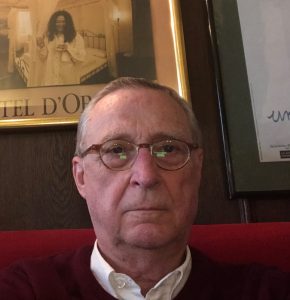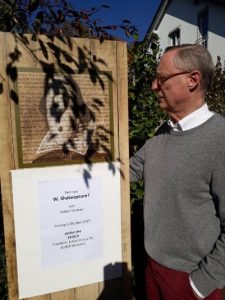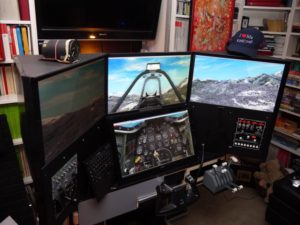Volker Tristram: How I Became an Oxfordian

July 10, 2018
For about 30 years, I had only computers and PCs in mind. I joined IBM in 1969, having worked for them from 1964 on, as a student worker during my studies in Business Economics in Cologne). Thus, I saw and worked with, the first series of memory-programmable mainframes (/360 Series) right from the beginning.
An exciting and often challenging job… and then I was sent into early retirement in 1996.
What to do with my new-found free time?! Some friends suggested studies. The local university (Ludwig-Maximilian University, Munich) offered courses that were open to seniors. One of them was about English Literature. When I went to my first course, around 1998, the lecturer was Prof. Andreas Hoefele, a well-known Shakespearean scholar. Over the following semesters, he gave detailed interpretations of all of the Bard’s pieces. He was so good and convincing, that I decided that this was a good subject for me to study in-depth. I became a kind of ‘permanent student’ in Hoefele’s courses, and I began reading…
Greenblatt was the first, but immediately followed by Richard Paul Roe’s “Shakespeare’s Guide to  Italy” — friends had given me the book as a birthday present. That changed my whole view on the author named “Shakespeare”! Henceforth, in addition to the plays and the commentaries in the textbooks, I scoured the libraries and bookshops for works on the authorship question. I was hooked! Very soon, I became aware of the German “Oxford Society” called Shake-Speare Society (www.shakespeare-today.de); and spent many days spent browsing through the internet, happened on the Shakespeare Oxford Fellowship. So now I am – and enjoy – membership in the official Deutsche Shakespeare Gesellschaft (Stratfordians all), the Shakespeare-Today, and the SOF.
Italy” — friends had given me the book as a birthday present. That changed my whole view on the author named “Shakespeare”! Henceforth, in addition to the plays and the commentaries in the textbooks, I scoured the libraries and bookshops for works on the authorship question. I was hooked! Very soon, I became aware of the German “Oxford Society” called Shake-Speare Society (www.shakespeare-today.de); and spent many days spent browsing through the internet, happened on the Shakespeare Oxford Fellowship. So now I am – and enjoy – membership in the official Deutsche Shakespeare Gesellschaft (Stratfordians all), the Shakespeare-Today, and the SOF.
My interest in all matters Shakespeare/Shaksper is so great that I have been boring my friends with tales of the bard’s life and works, until they asked me to give a talk on the subject. That is where I gave my first presentation, on “Shakespeare and His Plays” as an introduction to the man and his works for those who want to know more. A year later, people from that audience asked for another talk. That led to “Who Was Shakespeare?” which focused on the authorship question.
For more than 20 years now, I have been studying Shakespeare and it has not only given me great joy but I have also made new and exciting friends and acquaintances, like Tom Regnier, Robert Detobel, and Bastian Conrad, the author of “The True Shakespeare: Christopher Marlowe”. The study  of Shakespeare, the time, the man, the works, has become much more than a pastime.
of Shakespeare, the time, the man, the works, has become much more than a pastime.
Whenever I tire of Shakespeariana or Oxfordiana, I still have my studies in Modern History (the two wars), History of Christian Religion, and my beloved Flight Simulator. I just love to take my Spitfire or Me 109 for a spin across the Channel, land in England and be gone before I am caught by the local constabulary…
— Volker Tristram
“How I Became an Oxfordian” is edited by Bob Meyers. You may submit your essay on this topic (500 words or less in an editable format such as MS Word), along with a digital photo of yourself, to: communications@shakespeareoxfordfellowship.org. Also include a sentence about yourself (e.g., “John J. Smith is a businessman in San Francisco.”)
SOF memberships are now available on our membership page.
Membership dues cover only a fraction of our budget, including all our research, preservation and programming. Please support the SOF by making a gift today!
Blue Boar Tavern: Wassail Q&A
Tuesday Dec. 17, 8pm E / 5pm P
Sign up below for event invites!
